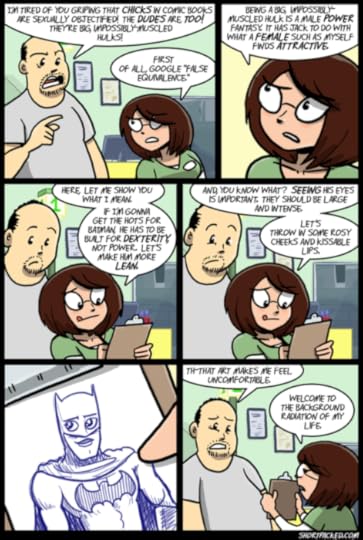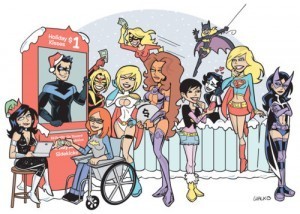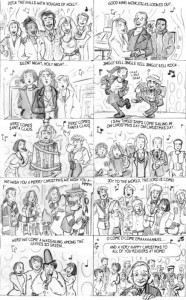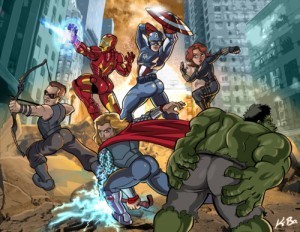Tansy Rayner Roberts's Blog, page 125
December 15, 2011
Friday Links removed a Womble's Head
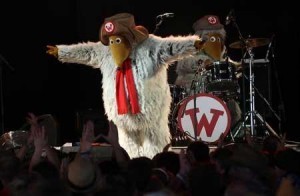 OK this is my favourite news article of the week – a Womble performer traumatised a nation (well, the six year old portion of the nation) when he accidentally removed his head during a live webfeed. Now, my first reaction was basically that it's awesome that the Wombles are a THING again for today's kiddies. As a mother of a six year old myself (who broke my heart with her reaction to finding out about the Santa thing last year)… seriously?
OK this is my favourite news article of the week – a Womble performer traumatised a nation (well, the six year old portion of the nation) when he accidentally removed his head during a live webfeed. Now, my first reaction was basically that it's awesome that the Wombles are a THING again for today's kiddies. As a mother of a six year old myself (who broke my heart with her reaction to finding out about the Santa thing last year)… seriously?
"Parents from around the UK said the 'damage had already been done' and that they had been forced to come up with 'all kinds of explanations' about why there was a human inside a Womble."
HOW MANY KINDS OF EXPLANATION ARE THERE?
Elsewhere in the world, Aqueduct Press continue their marvellous blog series of posts about the Best Reading, Listening, Viewing, etc. in 2011. I like especially that the contributors are asked to talk about what they enjoyed, but not limit themselves to work published this calendar year. And I was honoured to be asked to talk about my own favourite things of 2011. I forgot lots of things, of course, but that's what my own blog is for!
Also, Brit Mandelo of Tor.com blogs about her new reprint anthology, Beyond Binary, which includes a story by MEEEEE as well as a whole bunch of more famous and wonderful writers. Hooray for genderqueer SF being talked about!
Nnedi Okorafor blogs powerfully about her discomfort in discovering, in the wake of her marvellous World Fantasy win for Best Novel, that the trophy depicts the head of a very racist, unpleasant person. Ie. H.P. Lovecraft. Which has led to all kinds of conversations across Twitter and other forums about, you know, what kind of alternative trophy could better represent excellence in fantasy fiction, or the history of fantasy literature. I suspect TRADITION is going to win out on this one, or at least a combination of tradition and resistance to change, which are not entirely the same things, but personally I can think of a whole bunch of other unpleasant heads which could take his place. Like Medusa!
Sarah Rees Brennan continues to point out the horrible double standard we have in our culture when it comes to talking about female fictional characters, as opposed to male characters, and the extra levels of perfection (BUT NOT TOO PERFECT) that fictional women are supposed to attain.
Meanwhile, a chap explains male privilege to other chaps. I always enjoy a good explanation of such things, that can be widely linked to, and makes a postitive contribution to the conversation. A part of me though is always a little bit sad, knowing that women have been patiently (and sometimes less than patiently) explaining things rather a lot longer, and it often seems like the message is more heartily supported and embraced when it comes in a male voice. Sigh.
Speaking of men fighting the feminist fight (and don't think I'm not grateful, cos I'm busy baking shortbread and wrapping Christmas presents, yo no this is not sarcasm, I am actually too busy being barefoot & domestic to deal with internet feminism right now) Mondy has been talking about the latest Gardner Dozois Best of Science Fiction anthology, and the importance of looking at gender breakdowns. I'm linking to his blog because that's how I take my internet these days (livejournal, I do not miss you and your nested comments of rage) but apparently there's a whole lot of something-something going on in the comments of said LJ, which I think is under the name mondyboy. My Christmas present to myself this year is not reading said comments. LIFE IS WONDERFUL AND I AM ON HOLIDAY.
Meanwhile, DC Women Kicking Ass, a fabulous Tumblr, is talking about the failure of mainstream comics to market effectively to women, when they have actual properties women who don't necessarily hang out in comic shops (WHO KNEW?) might be interested in.
Another of my pet topics, that of gendered toys, made the news this week with the announcement that Hamleys, the iconic toy store in London, is getting rid of its 'boys' and 'girls' floors. This comes after an ongoing Twitter campaign complaining about them, though they claim it is a coincidence that they made the decision. At a time when the gender divide of toys is getting worse and worse, it's nice to see such a positive step. Having been raging about Lego excluding girls from their main range of toys for years, I'm now discovering the wonderful world of action figures thanks to Raeli's action figure obsession. And once again, it turns out, the representation of female characters in comics and superhero movies turns out to be a hell of a lot better than what happens in the toy industry. Damn it.
(after feeling guilty for realising that it didn't occur to me until recently to buy my Doctor Who fangirl daughter a sonic screwdriver, purely because she's a girl, I had a revelation this week that I have also never been able to bring myself to buy her a toy oven/kitchen set BECAUSE SHE'S A GIRL, even though she adores such toys when she plays with them elsewhere. She'll live, I reckon.)
Some baking goodness, because linking is easier than actually baking. My friend Iz who is currently building a Moomin House out of gingerbread sent me a Finnish gingerbread recipe which comes with images and instructions that have been enabling her in this wild endeavour. And elsewhere on the internet, keeping in mind that I have to figure out what kind of Doctor Who birthday cake I am going to produce a certain little girl in January, I found this brilliant design for a Dalek Smash Cake, which can be taken apart to discover the jelly mutant dalek inside.
Finally, my favourite Christmas post of the week is by Neil Gaiman, who talks about his Jewish childhood and the desirability of Christmas trees. As a non-Christian, lapsed pagan who is big on traditions being flexible, the Christmas tree is probably the most powerful image of what the festival means to me, and I love hearing about other people's emotional attachment to it.
I can't express enough how awesome it was to have two little girls decorating the tree with us this year, and that Jemima is now old enough to hang decorations without automatically gnawing on the tree branches, or stealing plastic-wrapped candy canes to see how many she can fit in her mouth. Also, that Raeli has now heard my stories behind every collected-while-travelling Christmas decoration so many times that she can recite them herself, and she has her own collection of decorations and stories from daycare, kinder and prep, thanks to the crafty factory that kicks into gear in schools across the country at this time of year.
Did you know that the Wombles were aiming for the Christmas No. 1 single this year in the UK? DID YOU?
December 14, 2011
My Christmas Culture
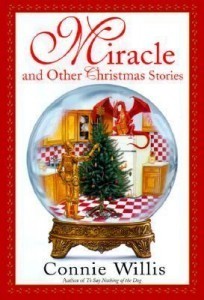 I always think of Connie Willis at Christmas time. One of my favourite of her books is a collection of short fiction, Miracle and Other Christmas Stories, many of which were written for Asimov's December issues over a decade or so. The title story feels like quintessential Willis short stories, because it is a romantic comedy with speculative elements, and includes references classic pop culture of some kind. In this case, it is a debate between which Christmas film is superior, Miracle on 42nd Street (the original) or It's a Wonderful Life. At the time I first read this story, I hadn't seen either film. They occasionally screen in Australia, more often now than when I was growing up, but they're not as pervasive as they apparently are in the US at this time of year!
I always think of Connie Willis at Christmas time. One of my favourite of her books is a collection of short fiction, Miracle and Other Christmas Stories, many of which were written for Asimov's December issues over a decade or so. The title story feels like quintessential Willis short stories, because it is a romantic comedy with speculative elements, and includes references classic pop culture of some kind. In this case, it is a debate between which Christmas film is superior, Miracle on 42nd Street (the original) or It's a Wonderful Life. At the time I first read this story, I hadn't seen either film. They occasionally screen in Australia, more often now than when I was growing up, but they're not as pervasive as they apparently are in the US at this time of year!
I went out and watched both movies, as I usually do when Connie Willis structures a story around a piece of Classic Hollywood. They're both very good movies. But neither of them, for me, has a patch on the personal resonance of, say, Bernard and the Genie, which I adore beyond all reason, or even the resonance of "Miracle" itself.
It's all personal, though. Christmas cultural texts come from our childhood, from happy moments in our lives, or they just happen like lightning – like anything else that becomes a new, instant favourite. But really, I didn't start thinking about Christmas texts until I read "Miracle." So it's rather meta that, at Christmas time, I start getting the urge to re-read that story.
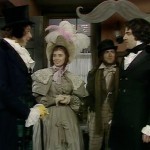 In my teens, Christmas became a form of rebellion. My Mum had been putting on Christmas festivities for me for my whole childhood and frankly, she was done. Stockings, tree, meh. It wasn't really her thing at all. So I took over. I filled the damn stockings and decorated the tree, and while I never went to far as roasting a beast (we weren't really roast kinds of people, the two of us preferring cold seafood picnics on the day) I took on a lot of the energy and work of making Christmas feel Christmassy (the work which now I perform as a mum of small children) because the alternative was not having it at all.
In my teens, Christmas became a form of rebellion. My Mum had been putting on Christmas festivities for me for my whole childhood and frankly, she was done. Stockings, tree, meh. It wasn't really her thing at all. So I took over. I filled the damn stockings and decorated the tree, and while I never went to far as roasting a beast (we weren't really roast kinds of people, the two of us preferring cold seafood picnics on the day) I took on a lot of the energy and work of making Christmas feel Christmassy (the work which now I perform as a mum of small children) because the alternative was not having it at all.
I had a much-worn VHS of Christmas UK shows that I watched over each year while wrapping presents and doing all that festive stuff. I barely remember now what was on it – Blackadder's Christmas Carol, yes, and a pretendy family video by Smith and Jones, and a Lenny Henry Christmas special, I think. That sort of thing. A bunch of things that had all been on at the same time one year and were now preserved in video tape amber. We probably still have the tape somewhere, but I no longer have a working video (SAD) and a lot of those old tapes are pretty stretched and crackly now.
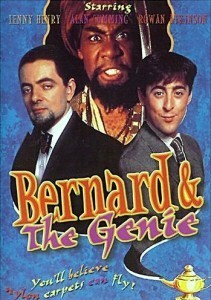 Then there was Bernard and the Genie. Which, to my dismay, I have still not managed to get hold of on DVD. I must hunt it down. It really is my favourite Christmas movie of all time, and I hope desperately that it holds up. It has Lenny Henry in it, right? And Alan Cummings? And Rowan Atkinson? It holds up, right? (already my inner Galactic Suburbanite is pointing out the minor role of women in the movie, damn it)
Then there was Bernard and the Genie. Which, to my dismay, I have still not managed to get hold of on DVD. I must hunt it down. It really is my favourite Christmas movie of all time, and I hope desperately that it holds up. It has Lenny Henry in it, right? And Alan Cummings? And Rowan Atkinson? It holds up, right? (already my inner Galactic Suburbanite is pointing out the minor role of women in the movie, damn it)
Maybe I'd better not watch it again. But… I always think of it when I hear that supermarket favourite, "It'll be lonely this Christmas." Also whenever I see pictures of Bob Geldof, because this movie was the first time I ever became aware of his existence. Him and Gary Lineker. True story.
What other Christmas texts resonate with me? More versions of A Christmas Carol, actually. I enjoy the Muppets one, though it's not a patch on Blackadder. I read the actual book about eight years ago, and was surprised at how good it was, all sleek tight prose and clever bits. Dickens had one good story in him, as far as I'm concerned, and it was this one – a near-perfect structure, and it's hardly surprising that new, different versions get told over and over again.
(Did I mention, though? Blackadder did it better)
Old movies generally, too. I associate High Society with Christmas because I first saw it (thanks to John Hinde) on Boxing Day. Also I have an annual tradition of noticing that one of the handful of Fred Astaire movies I've never seen is scheduled on TV, being delighted, and then missing it entirely. Not all traditions are about what you actually do…
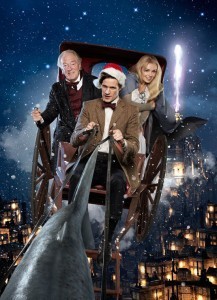 Then there's the Doctor Who Christmas Specials, which feels like a tradition that has been with us forever, but it really hasn't. I'm pretty sure last year was the first time that Australia actually got the special on terrestrial TV at Christmas (which for us means Boxing Day, thanks to living in the future), and back in 1996 when David Tennant's Doctor rang in the tradition, we had to wait something like 4-6 months. That was before I learned how to magically view things that weren't technically on the telly yet, too! Didn't figure that one out until… The Next Doctor, maybe? So Doctor Who Christmas Specials weren't actually a Christmas thing for our family until recently. I am rather chuffed about them now, though. Even if, away from the festivities, they're rarely as good as an everyday episode. They are CERTAINLY MORE CHRISTMASSY.
Then there's the Doctor Who Christmas Specials, which feels like a tradition that has been with us forever, but it really hasn't. I'm pretty sure last year was the first time that Australia actually got the special on terrestrial TV at Christmas (which for us means Boxing Day, thanks to living in the future), and back in 1996 when David Tennant's Doctor rang in the tradition, we had to wait something like 4-6 months. That was before I learned how to magically view things that weren't technically on the telly yet, too! Didn't figure that one out until… The Next Doctor, maybe? So Doctor Who Christmas Specials weren't actually a Christmas thing for our family until recently. I am rather chuffed about them now, though. Even if, away from the festivities, they're rarely as good as an everyday episode. They are CERTAINLY MORE CHRISTMASSY.
It may also be why last year's Doctor Who Christmas special is my favourite so far. And not because it's yet another version of A Christmas Carol…
The British tradition of Christmas specials is one that doesn't quite work in Australia. We try our best, but generally if we do get Christmas TV it's from a year or two ago. A few of the light entertainment shows do a half-hearted stab at the holiday, but mostly this is the period when our actors all fly to Britain to do panto, and there's nothing new on the TV at all apart from cricket, so the idea of having event TV scheduled now pretty much baffles us. Having said that, I'm not sure what I'm more excited about this year – Doctor Who or Downton Abbey. Or MAYBE BOTH.
There's the EastEnders Christmas special, too, which I don't watch, because the ABC deprived Australians of EastEnders somewhere around the late 80′s. But I got addicted again back in 2002 and followed the damn show through episode synopses for about 5 years afterwards, and I even now I do enjoy hearing about the EastEnders Christmas Doom of Kitchen Sink DOOM every year, in the Guardian.
Hogfather isn't my favourite Pratchett novel or even my favourite Susan novel but oh, it's Christmassy! I've read that at Christmas a few times. Back when I actually had leisure time at Christmas, HA. These days even getting around to rereading one Connie Willis short story will be a stretch… I have picked up the DVD of the movie, though, and will finally get around to watching it.
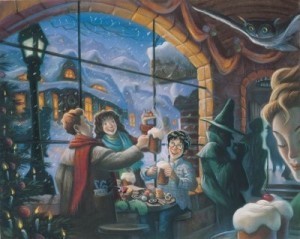 There is a clutch of cultural artefacts that remind me deeply of that Christmas we were in London, and had been travelling for five weeks, and couldn't take it any more, and just bought BOOKS, PRECIOUS BOOKS, even though they were far too heavy. The Last Hero, then, is a Pratchett book of greater holiday significance to me than Hogfather, as is The Lord of the Rings, both book and the first film. Likewise the first Harry Potter film, in which Christmas is the best bit (there is this argument actually for nearly every Harry Potter book or film ever. Christmas is ALWAYS the best bit, because of the jumpers.)
There is a clutch of cultural artefacts that remind me deeply of that Christmas we were in London, and had been travelling for five weeks, and couldn't take it any more, and just bought BOOKS, PRECIOUS BOOKS, even though they were far too heavy. The Last Hero, then, is a Pratchett book of greater holiday significance to me than Hogfather, as is The Lord of the Rings, both book and the first film. Likewise the first Harry Potter film, in which Christmas is the best bit (there is this argument actually for nearly every Harry Potter book or film ever. Christmas is ALWAYS the best bit, because of the jumpers.)
The Futurama Xmas episodes are fun, though we accidentally put one on the other week after decorating the Christmas Tree, only for it to freak out Jem completely. Then I realised that might be her first remembered encounter with a pop culture Santa. OOOOPS. Maybe should have gone with one of the Buffy Christmas episodes instead…
Wow, there's a lot more of this than I thought.
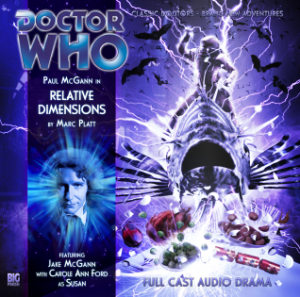 This year, if I choose to embrace one Christmas cultural text, I think it's going to be from Big Finish land. Last year I listened to Relative Dimensions, a lovely (if not overly HAPPY) audio play featuring the Eighth Doctor, Lucie, Susan and Alex, and I plan to do so again. Listening to audio, after all, can be done WHILE wrapping presents instead of, well, instead of.
This year, if I choose to embrace one Christmas cultural text, I think it's going to be from Big Finish land. Last year I listened to Relative Dimensions, a lovely (if not overly HAPPY) audio play featuring the Eighth Doctor, Lucie, Susan and Alex, and I plan to do so again. Listening to audio, after all, can be done WHILE wrapping presents instead of, well, instead of.
So, those of you who celebrate Christmas, what are your favourite bits of Christmas pop culture? What books, movies, short stories, music, TV specials, etc. do you like to embrace at this time of year, either alone or with your family? Which ones drive you up the wall? If you don't celebrate Christmas at all (or if like many you celebrate it but don't actually LIKE it) then are there any other times of year when you embark upon ritual reading, or watching, or listening?
December 11, 2011
Chumblies and Mad Scientists!
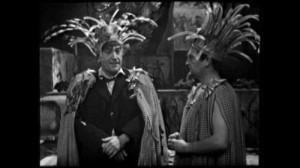 Last night, just before I went to bed, the rumours were bouncing around Twitter. I didn't know what the rumours WERE, but the implication was that maybe, just maybe, a missing episode of Doctor Who had been found.
Last night, just before I went to bed, the rumours were bouncing around Twitter. I didn't know what the rumours WERE, but the implication was that maybe, just maybe, a missing episode of Doctor Who had been found.
When I woke up – boom! TWO previously lost episodes were back in the BBC archive: Galaxy Four Part Three and The Underwater Menace Part Two. It's so long since a new episode came to light, and it was generally believe that this was it, we had reached the end of salvaged film canisters.
Having recently read Richard Molesworth's history of the destruction and recovery of so many stories, and realising how close we came to having almost no Hartnell and Troughton available for rewatching, as well as how unlikely it seemed that anyone would have lost episodes and not realise the demand for them… I feel like the news stories reporting on this don't have nearly enough exclamation points!!!
Sure, it's not Power of the Daleks or the Myth Makers, but we get to see CHUMBLIES, the robots that were about the 14th attempt of the BBC to replicate the popularity of the Daleks (they weren't even trying at this point, and apparently made mini-Daleks out of marshmallows) and we get to see Patrick Troughton being Patrick Troughton, in what is now the earliest surviving episode of his run.
Also, all over again, we have that foolish, foolish hope that some day, there might be ANOTHER film collector who hasn't been on the internet, and one day there may be more.
Recovered clips below – because the entire things are not of course on the internet yet. We might have to wait for the DVD release!
December 10, 2011
Australian Women Writers 2012 National Year of Reading Challenge
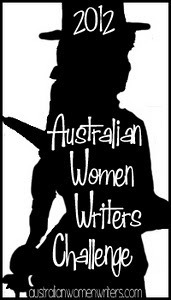 Well, of course I signed up. How could I not?
Well, of course I signed up. How could I not?
Challenge period: 1 January 2012 – 31 December 2012
Goal: Read and review books written by Australian women writers – hard copies, ebooks and audiobooks, new, borrowed or stumbled upon by book-crossing.
Genre challenges:
Purist: one genre only
Dabbler: more than one genre
Devoted eclectic: as many genres as you can find
Challenge levels:
Stella (read 3 and review at least 2 books)
Miles (read 6 and review at least 3*
Franklin-fantastic (read 10 and review at least 4 books)*
* The higher levels should include at least one substantial length review
====
I'm going to try for the Franklin-fantastic, since it seems entirely do-able considering that I tend to read 100+ books in a year, and a lot of those would naturally be female Australian authors anyway. My own personal twist on the challenge is that I want the books in question to all be taken off my To Read Shelf – because reducing that is the main thing I want to accomplish with my reading next year. I'm not planning to go with genre restraints but 'dabbler' seems the most likely category for me, possibly with a side order of 'devoted eclectic'.
Eligible Books on my To Read Shelf by Australian Women Writers:
Anonymous, The Bride Stripped Bare (erotica? literary?)
A.A. Bell, Diamond Eyes (SF)
Cath Crowley, Chasing Charlie Duskin (YA)
Marianne De Pierres, Angel Arias (young adult, fantasy, hints of SF)
Melaina Feranda, Thirteen Pearls (young adult)
Cordelia Fine, Delusions of Gender (non-fiction, social science)
Kerry Greenwood, Murder in the Dark (historical, crime)
Narrelle M. Harris, The Opposite of Life (vampire is a genre, right?)
Norma Hemming, Dwellers in Silence: Stories and Plays
Colleen McCullough, Antony and Cleopatra (historical)
Kirstyn McDermott, Madigan Mine (horror)
Melina Marchetta, Finnikin of the Rock (YA, spec fic?)
Catherine Helen Spence, A Week in the Future (science fiction, I believe)
Lili Wilkinson, A Pocketful of Eyes (YA)
Kaaron Warren, Mistification (goodness knows)
Danielle Wood, Rosie Little's Cautionary Tales for Girls (literary?)
I'm also counting whichever of the Twelve Planets books arrive over the next year! I am expecting titles by Deb Biancotti, Kaaron Warren, Narrelle Harris, Margo Lanagan, and several more. So, woohoo!
December 8, 2011
Friday Links When It Sizzles
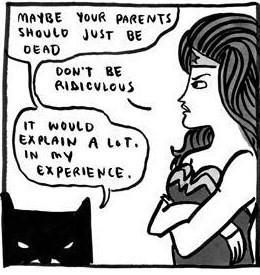 Some personal links first: I made a reprint sale to Beyond Binary, an anthology of genderqueer SF, edited by Brit Mandelo for Lethe Press. I'm super excited about it, not only to be a Lethe Press author now, but also to share a TOC with such amazing writers as Nalo Hopkinson, Ellen Kushner, Delia Sherman, Catherynne Valente and Sandra McDonald. The story in question is "Prosperine When It Sizzles," which first appeared in shared world anthology New Ceres Nights. I have a soft spot for M. Pepin and La Duchesse, so delighted to see that story get a wider audience.
Some personal links first: I made a reprint sale to Beyond Binary, an anthology of genderqueer SF, edited by Brit Mandelo for Lethe Press. I'm super excited about it, not only to be a Lethe Press author now, but also to share a TOC with such amazing writers as Nalo Hopkinson, Ellen Kushner, Delia Sherman, Catherynne Valente and Sandra McDonald. The story in question is "Prosperine When It Sizzles," which first appeared in shared world anthology New Ceres Nights. I have a soft spot for M. Pepin and La Duchesse, so delighted to see that story get a wider audience.
Also I've been meaning to link for ages that my story, "Taking Leaves," which was one of the winners of the Love2Read competition of fiction about reading disabilities, now has an audio version available. You can listen by streaming it from the site.
A new Hark, a Vagrant! is always cause for celebration, but this one is especially pertinent and awesome this week because it's all about Wonder Woman. Kate Beaton is a cynical genius.
Bluemilk often writes wonderfully about parenthood and feminism, and this post about crying babies on aeroplanes struck a chord with me. There really are two kinds of people, those who have empathy for parents struggling with noisy children/babies in public, and those who don't. Often, sadly, that empathy can depend on how personally close you are to the experience of trying to function with small children in public.
This essay about the growing phenomenon of women cosplaying femme versions of the Doctor is fascinating, with some great pics. I find this particular aspect of fandom close to my heart because my daughter came up with it independently, playing Matt Smith's Doctor in the playground (sometimes with male friends as companions and the Master, though on one notable occasion she had corralled four other girls to play River Song, Melody Pond, Amy Pond & young Amelia OH HELL YES that's my girl) and back in July kept her bedroom tidy for a whole month in order to earn a red bowtie for herself.
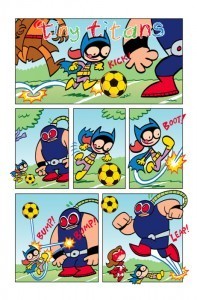 Speaking of adorable, Tiny Titans recently took on that mysterious purple woman who appears in the background of all the new 52 titles at DC – this interview with the men who write & draw Tiny Titans is fabulous and makes it clear why the comic is so damn good. They love what they are doing, they respect their kid & adult readers, and they are having SO MUCH FUN. I can highly recommend Tiny Titans trades as Christmas presents for the geek kids in your life.
Speaking of adorable, Tiny Titans recently took on that mysterious purple woman who appears in the background of all the new 52 titles at DC – this interview with the men who write & draw Tiny Titans is fabulous and makes it clear why the comic is so damn good. They love what they are doing, they respect their kid & adult readers, and they are having SO MUCH FUN. I can highly recommend Tiny Titans trades as Christmas presents for the geek kids in your life.
Nicola Griffith talks about the 'showrooming' practice of online shoppers browsing real bookstores and then buying the product elsewhere – and about how this is something the bookselling industry should be using. I am reminded just a bit of a certain short story I wrote for Sprawl which depicts a possible future of bookselling for busy parents. Never mind the charming book professional who flatters you at the door and finds you the books you didn't know you wanted to buy… if you want someone like me to browse books anywhere other than my laptop, you're gonna have to provide entertainment for my kids.
Also, a very cute post on Tor about the history of the portrayal of futuristic books in science fiction.
Galactic Suburbia Episode 48
The new episode of Galactic Suburbia is up, go download it, stream it, or do whatever it is you crazy kids do with podcasts these days!
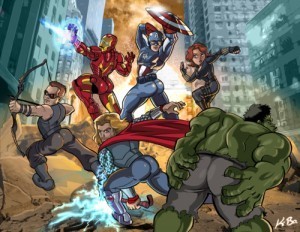 In which we save the Tasmanian Devils, take on the Classics, review cars, discover that toy fandom exists, plan to read LOTS of Australian women writers, and Wonder Woman still doesn't have pants.
In which we save the Tasmanian Devils, take on the Classics, review cars, discover that toy fandom exists, plan to read LOTS of Australian women writers, and Wonder Woman still doesn't have pants.
News
Coffeeandink on The Erasure of women writers in SF and Fantasy
Mur Lafferty – My Problem With Classics
Open letter to publishers: book bloggers are not your bitches
Kate Gordon's Devil Auction – help to save the Tasmanian Devils! (kitten pictures with TEETH)
Australian Women Writers Challenge
Sign up now
Jason Nahrung posted a list of the books he plans to read for the challenge – let us know what yours are!
In association with this, Tansy produced a list of award-winning SF/Fantasy books by Australian women.
Please keep sending in your suggestions for a Galactic Suburbia Award – we hope to have a plan for this by our 50th episode and are loving reading the tweets and emails so far.
What Culture Have we Consumed?
Alisa: Bellwether by Connie Willis; American Horror Story; Yarn by Jon Armstrong
Tansy: Akata Witch by Nnedi Okorafor; Jingo & The Fifth Elephant by Terry Pratchett; Shortpacked, a webcomic about toy fandom, obsessed people, lots of GLBTQ characters and feminist commentary on pop culture such as this strip about False Equivalence.
Alex: Coode St podcast with Ursula le Guin, and also with Ian McDonald and Alistair Reynolds; Spook Country, William Gibson; One of Our Thursdays is Missing, Jasper Fforde; Pirates of the Caribbean 4!
 Feedback from Kitty of Panel2Panel:
Feedback from Kitty of Panel2Panel:
Reasoning With Vampires
Kitty's post about why Marvel has no equivalent hero to Wonder Woman
TANSY RECS for DC comics that don't treat women appallingly:
Birds of Prey (start as early as possible, either with the Chuck Dixon issues which are pretty good, or the Gail Simone run which is #56-108)
Power Girl: A New Beginning & Aliens and Apes – Justin Gray, Jimmy Palmiotti, Amanda Conner
Catwoman run by Ed Brubaker
Stephanie Brown Batgirl: Batgirl Rising, The Flood etc.
Secret Six, Gail Simone
Batwoman. Anything with Batwoman.
I HAVE NOT YET FOUND THE PERFECT WONDER WOMAN TRADE TO RECOMMEND. But I do think anyone interested in comics history could get value from reading her first year of adventures, available as Wonder Woman Chronicles Vol. One
Marvel dude saying we don't have to have female characters
Australian podcasts about comics: Panel2Panel and How I Got My Boyfriend Into Comics
Please send feedback to us at galacticsuburbia@gmail.com, follow us on Twitter at @galacticsuburbs, check out Galactic Suburbia Podcast on Facebook and don't forget to leave a review on iTunes if you love us!
December 4, 2011
Pratchett's Women IV: His Henpecked Voice
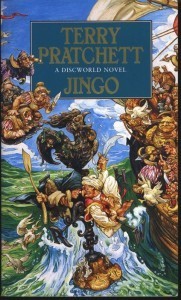 Jingo (some spoilers)
Jingo (some spoilers)
The Fifth Elephant (ALL THE SPOILERS)
Both Jingo and The Fifth Elephant missed their mark entirely with me, when I first read them on first release. Which meant that on my recent reread, I at least had fairly low expectations for them.
Jingo on the whole fared much better than the first time around, at least as far as a Vimes and City Watch novel is concerned. The prose is clever and tight, and there are many crunchy themes surrounding war, patriotism, etc. It's one of those Discworld books that transcends the comedy to have a deeper philosophical meaning, plus as many Leonardo Da Vinci jokes as any sane person would ever want in one place.
However, the thing it doesn't have is much in the way of… you guessed it, women.
Sybil appears in a few scenes, and is largely reduced to the role of nagging wife. I do love the bit where she chides Vimes for treating her as if she is nagging him and points out how unfair it is, but that's Sybil for you, grasping any attempt to be awesome, in the face of difficult circumstance. She very much there to point out how awkwardly Vimes is assimilating into the upper classes, and in some cases how well he is assimilating, and to wave a few warning flags that his current workaholic lifestyle is unsustainable. This at least will be followed up in later books.
Cheery sadly barely appears at all, and there is little to follow up on her interesting debut back in Feet of Clay. Again, this is something that will be addressed later.
Angua's role in Jingo was the greatest disappointment, as Pratchett does that thing where he introduces her POV early on and suggests that her character has some intriguing issues to deal with, and then largely forgets about her for the rest of the book. This is not the only time he does that thing. I was especially irritated that she was put in the narrative role of damsel in distress. I can see how the Watch and Carrot's attitude about how Angua's awesomeness means she can never ever be in danger is the kind of complacency that begs to be challenged, from the point of view of telling a good story. However, when you started out with a subversive character, subverting her main feature by making her vulnerable and a captive is not actually all that revolutionary when she is, in fact, the blonde girl.
I liked that she ultimately rescues herself, but that didn't entirely make up for the fact that she serves the narrative role of damsel in distress, and her own POV is rarely used.
The most poignant and/or problematic treatment of women in Jingo is the sub-plot where Nobby Nobbs has to (well, "has to" is perhaps too strong a phrase) dress up as a lady as part of his spying activities for the Patrician, and is so stunned to see what life is like from that different perspective (especially how he is treated by the men around him, including those who know exactly who he is) that he turns into a radical suffragette and refuses to let go of his feminine identity.
I still haven't decided yet if this storyline is hilarious, offensive or a smart bit of characterisation. It's an oddity, really. It's also something Pratchett doesn't let go of, returning in later books to the cross-dressing (and occasionally feminist) tendencies of Corporal Nobbs.
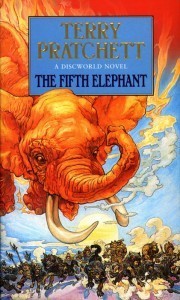 Which brings us to The Fifth Elephant. I have no idea why I wasn't keen on this one last time around, because while the story and writing isn't quite as tight as in Jingo, it has major plotlines surrounding Angua, Sybil and Cheery, plus OTHER female characters, and that kind of awesomeness needs to be encouraged.
Which brings us to The Fifth Elephant. I have no idea why I wasn't keen on this one last time around, because while the story and writing isn't quite as tight as in Jingo, it has major plotlines surrounding Angua, Sybil and Cheery, plus OTHER female characters, and that kind of awesomeness needs to be encouraged.
Sybil's role looked unpromising at first. The story revolves around the whole gang going on a diplomatic junket to the mysterious Übervald, a country loosely based on Translyvania by way of Germany, France, Wales and judging by Stephen Briggs's voice performance (I'm still on the audiobook kick) basically anywhere with an accent. Anyway, for the first part of the story, Sybil's role mainly involves packing, and settling in at the embassy. But while everyone knows that having Vimes as a diplomat is a colossal joke, Sybil proves invaluable in that role. The scenes where she shows her deep appreciation of dwarf opera, something that proves to be essential in a moment of diplomatic crisis, are wonderful, as are Sybil's mighty heroics at the end.
I also like that we get deeper appreciation of who Sybil is as a person. The very unpleasant Baroness von Überwald (AKA Angua's mum) sees her as a foolish, overly friendly person, and we later see her perceptions of Sybil's behaviour sharply deconstructed through her own POV. It's very important to get these scenes through Sybil's eyes, and indeed through those of the Baroness, as we were in danger otherwise of having her character almost entirely portrayed through the POV of Vimes.
The further story of the Sybil-Vimes marriage is also developed. In amongst the obvious problems they face, whereby Vimes is married to his job first and to Sybil second, we get to witness some lovely scenes that show why their marriage works, and how it has improved life generally for both of them. My favourite is the scene told mostly through dialogue in which they, in bed at night, hear the various bumping noises happening in the embassy below them, and take turns guessing which of the appalling stuffed heads are being removed (at their request) based on sound alone.
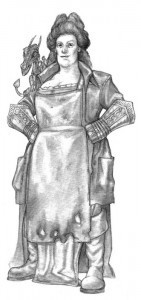 There's also the running almost-joke about Sybil having something to tell Vimes, which she is finally able to do only at the end of the story: they are having a baby! While this is telegraphed quite clearly and hardly likely to be a surprise to the reader, that's not the point of this reveal. After a rather adorable conversation in which Vimes tries as diplomatically as possible (so not his strong point!) to ask how safe the pregnancy is considering her age, she puts him down very sharply by insisting that breeding is pretty much what her family were designed for, and he should stop asking silly questions. But beyond this, Vimes has to make a new choice about how to life his life, and that's something we will see reflected in his later books: when they leave Übervald, rather than racing right back to his work at home, he gives Sybil a real holiday by suggesting they travel back by the slower and more touristy route (or, as Nanny Ogg would put it, they went the long way and saw the elephant). Vimes as a father is going to be trying rather more strenuously to achieve a work-life balance than Vimes in his early days of marriage, and this is the first sign that he is willing to make that change.
There's also the running almost-joke about Sybil having something to tell Vimes, which she is finally able to do only at the end of the story: they are having a baby! While this is telegraphed quite clearly and hardly likely to be a surprise to the reader, that's not the point of this reveal. After a rather adorable conversation in which Vimes tries as diplomatically as possible (so not his strong point!) to ask how safe the pregnancy is considering her age, she puts him down very sharply by insisting that breeding is pretty much what her family were designed for, and he should stop asking silly questions. But beyond this, Vimes has to make a new choice about how to life his life, and that's something we will see reflected in his later books: when they leave Übervald, rather than racing right back to his work at home, he gives Sybil a real holiday by suggesting they travel back by the slower and more touristy route (or, as Nanny Ogg would put it, they went the long way and saw the elephant). Vimes as a father is going to be trying rather more strenuously to achieve a work-life balance than Vimes in his early days of marriage, and this is the first sign that he is willing to make that change.
I am glad for all the Sybil awesomeness in The Fifth Elephant because I have to say, I wasn't happy with how Angua's storyline was handled. This is the book that takes us to ˆÜbervald, where Angua comes from, and shows us her family. I found it really bizarre, then, that so much of this important character development and the reveals happen without Angua's involvement at all, or without her POV. She literally disappears from Ankh-Morpork, leaving the focus of the storyline on Carrot and Gaspode's quest to find her. Then, when they catch her up, and she and Carrot finally get a chance to discuss what her emergency is, how it ties in with her family history, and how all this affects their relationship, the whole scene is told from the point of view of Gaspode the freaking Wonder Dog.
Now, I'm a big fan of Gaspode. And this is a natural result from Pratchett's traditional method of using the omniscient point of view – because he has the choice of any of his characters, he usually chooses the one whose take on the scene is most likely to be funny. Which is fair enough. But it's only since I started this reread looking specifically at the portrayal of female characters in the Discworld that I realised the downside of his technique. He sometimes uses a character's point of view only a few times, and doesn't necessarily follow up on them – as long as the plot is tied up, the character point of view occasionally gets lost, and Angua is a definite casualty of this.
It could be argued that this works just fine narratively – there is a theme running through this book that Angua is not, for instance, talked about amongst her family, as Vimes notices when he tries to mention her to her mother. Angua is also a necessarily private person. And there is no denying that, by the end of the novel, there is a great deal of resolution between her problems with Carrot (I am giving her the benefit of the doubt and suggesting that her complaints about him being too nice and tolerant are merely masks for her real concerns about the unsustainable nature of their relationship, otherwise she does come off as pretty damn unreasonable in their fight) and her feelings about her family.
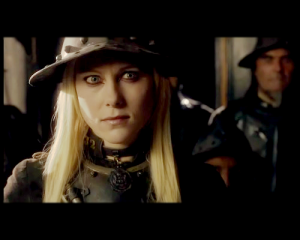 But… yeah. It feels like there are gaps in the story that could only be fulfilled by a little more Angua. Considering that one of the main bad guys is her brother, and fellow werewolf, and that trying to kill him so that he stays dead is a main thrust of the final act of the story, ultimately this didn't feel like the truly satisfying book I wanted it to be, and I still feel that Feet of Clay is a better showcase for her character.
But… yeah. It feels like there are gaps in the story that could only be fulfilled by a little more Angua. Considering that one of the main bad guys is her brother, and fellow werewolf, and that trying to kill him so that he stays dead is a main thrust of the final act of the story, ultimately this didn't feel like the truly satisfying book I wanted it to be, and I still feel that Feet of Clay is a better showcase for her character.
Thank goodness for Cheery! Our favourite feminine dwarf has some wonderful scenes, and while she doesn't quite have a storyline of her own, the subplot she does have is dealt with so cleverly and with such thoughtfulness that it brought me joy. And, considering she's only there in a sneaky subplot, she steals the stage towards the end when the whole dwarf politics storyline turns out to be far more relevant to Cheery's gender choices than anyone suspected.
Basically, if you found the 'coming out as a female dwarf' plot strand in Feet of Clay interesting, then The Fifth Elephant has it in spades, if you hang in there towards the end. We see Cheery's discomfort and rebelliousness in returning to her homeland of Übervald as a female dwarf, and are shown quickly how the Ankh-Morpork dwarf community, which has fast adapted to the trend of femaleness despite some resistance, is far more liberal than those dwarves back home. Dwarf culture is definitely something Pratchett has put a lot more thought into since Guards Guards, and I loved the idea that their greatest romantic opera was between two DWARVES, and it was culturally important not to question which of the two dwarves was female.
Which leads to the double whammy reveal at the end of the story, not only that the dwarf who perpetuated a key crime is a woman, and that a large part of her motivation is a frustration at how the changing times has allowed other dwarves to reveal and revel in their own femininity, but also that the quietly liberal king they have managed to keep on the throne is, say it with me, ALSO A WOMAN.
Pratchett really loves doing this. He did it in Feet of Clay – the joke that you think a character is male, but is really female. Later (and I will get to it eventually) he structured an entire novel around that reveal, over and over again. I am intrigued with his fascination with what has basically become a Discworld trope, because it allows you to say (and not say) so much about gender and gender politics, and for the most part these kind of gender-bending games are mostly found in the literature of the more avante garde and hardcore feminist writers.
It might have started out as a joke, but as with many Pratchett joke, it's a soft centre wrapped around a sharpened axe.
I want to squee more about Cheery, but I'm running out of space. Suffice to say: I love that she becomes Sybil's ladies maid, I love the scene at the end where she decides to dress 'as a dwarf' (ie present as male) in front of the king because she knows she will have the support of her friends and allies if she wears a dress, but has moved past feeling the need to do so for every single occasion, and I LOVE the fact that her first response to the reveal about Dee (the villain dwarf) is to comfort her, one girl to another.
And, as she is only a little embarrassed about later, that she was actually only doing that to give Dee a chance to hand over really important information. Because she's a dwarf, and a woman, but she's also a damn good copper, and that comes before the other things.
I now think that Cheery Littlebottom may well be my favourite Discworld character. I so didn't see that coming.
Some other female-character-highlights of The Fifth Elephant include the glamorous vampire-on-the-wagon Lady Margalotta, and Angua's bitchy Baroness mother. Nice to have some antagonist characters in these books who are female from the start, rather than only being revealed as such in the last five pages.
=====
Previous posts in this series:
Pratchett's Women: The Boobs, The Bad and the Broomsticks
Pratchett's Women II – Slash! Stab! A Lesson in Practical Queening in Lords and Ladies
Pratchett's Women III – Werewolf Glamour and the Sexing of Dwarves in Guards, Guards!, Men at Arms, Feet of Clay
December 3, 2011
Verity Lambert, Patrick Troughton, Jon Pertwee, Peter Davison (1983)
I am now going to be desperately disappointed if the 50th anniversary doesn't feature a similar round-table with all living Doctors talking about the role while eating jelly babies. We have eight, that could be quite a bun fight!
Also, Verity Lambert has always been a feminist hero of mine – a 28 year old woman who was the youngest producer, and only female drama producer, at the BBC, and was given this bizarre white elephant of a TV show to run back in 1063, she not only made a success of Doctor Who (she approved the first Dalek script against advice from others, sealing the show's early triumph of ratings and pop culture madness), but went on to have a long and substantial career elsewhere. She was Head of Drama at ITV when they were producing The Sweeney, Minder, Rumpole of the Bailey and the Naked Civil Servant, she produced John Cleese's feature Clockwise during a brief film production interlude, and finally set up her own independent production company, Cinema Verity, which was responsible for one of my favourite obscure TV shows, Class Act (starring Joanna Lumley, John Bowe and Nadine Garner). She also moonlighted freelance producing work with the BBC, such as Jonathan Creek, another old favourite of mine.
I was extra delighted to learn recently that she was also a devoted Gooner, when Alan Davies reminisced about being at a particular game with her, on his Arsenal podcast The Tuesday Club. Female Arsenal fans are far more of a minority than female Doctor Who fans have ever been, so I grabbed this piece of information with great joy.
Ahem, got a bit sidetracked there. I'd never seen her interviewed before, at least while so young, and this one is very cool, with the added bonus of several Doctor actors bickering amiably together.
December 2, 2011
On False Equivalence
December 1, 2011
Tumblr ate my Friday Links
Well, Tumblr and Nanowrimo are joint culprits, I think. I'm about 500 posts behind on my blog reading for the week, so no Friday links today!
Instead, I give you FESTIVE FRIDAY LINKS IN PICTURES!
And for those of you who aren't feeling remotely festive yet, and are missing the usual rounds of gender/feminist commentary you might find in a Friday links post, there's always this:
Because sometimes superhero butts really do say it all.

